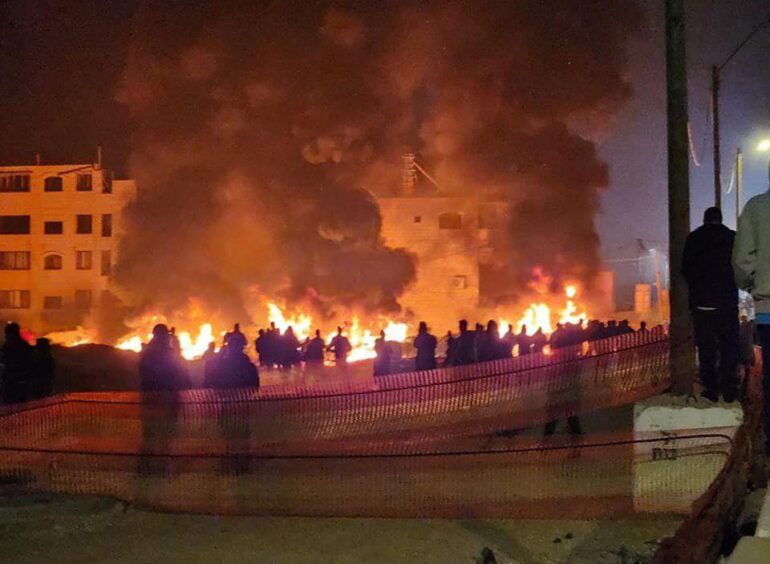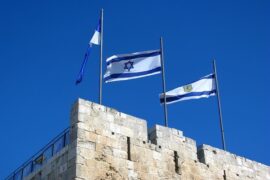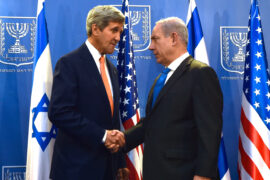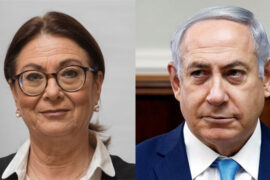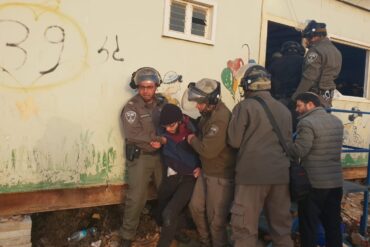Sunday was a difficult day in this country.
Brothers Hillel and Yagel Yaniv were murdered while traveling through the Palestinian community of Huwara (the main north-south road Jews and Palestinians travel on passes through Huwara). The usual footage of Palestinians passing out celebratory candy was spread by pro-Israel advocates on social media. Then a few hours later, local Jews launched a revenge attack on Huwara, torching several homes and cars.
I see a lot of lessons we can take away from Sunday’s events but they require courage and intellectual honesty. Despite the challenges that typically accompany breaking out of one’s comfortable narrative, we need to be creative in our thinking and more honest with ourselves if we ever hope to achieve change. My hope is that readers take time to carefully consider my points and keep in mind that I’m presenting not only new ideas but also a new way of thinking.
Anyone with real knowledge of Palestinian society or with the way Palestinians have been experiencing the last hundred years should be able to appreciate their impulse to celebrate a successful action against Israelis. Palestinians for the most part experience Israel as a near invincible military fortress that controls almost every aspect of their lives. So when Palestinians lash out and manage to draw blood from the system perpetuating their feeling of powerlessness, it makes sense that certain sectors of their society would experience a sudden surge of jubilation.
When pro-Israel advocates try to depict Palestinians distributing sweets as proof of some irrational Jew hatred, it only serves to demonstrate how ignorant these advocates are of the realities Palestinians face. I don’t mean this as an argument for how Israelis should or shouldn’t respond to Palestinians celebrating the killing of our people. It’s an argument for deeper understanding and intellectual honesty.
Nearly all of Israeli society is oblivious to the fact that our security apparatus harms Palestinians to the extent that it does. Most Israelis don’t believe Palestinian violence to be acts of resistance to actual oppression. Most of us genuinely believe that Palestinians – or at least a high percentage of them – engage in violence against us or support said violence because they have some ideological drive to kill Jews and to strip us of the political independence we’ve spent thousands of years struggling to regain.
Given the fact that most Israelis believe this, it’s not hard to see how a ferocious revenge attack on Huwara by nearby Jews could be the most natural response to the killing of two Jews by Palestinians there.
The “Shkhemnikim” – Jews living in the Samarian mountains around Shkhem (Nablus) in the northern West Bank – don’t experience the conflict the way most Israelis or Palestinians do. They largely see themselves as a native tribe living authentic Jewish lives outside of Israel’s state structure and locked in a somewhat horizontal conflict with other local tribes. It’s a very different relationship dynamic than colonizer and colonized.
The Jewish violence that took place in Huwara this week is a different kind of violence than what Palestinians normally experience from Israel. In some ways, it’s actually much closer to the violence that takes place between other regional groups. There’s no pretentiousness in this type of violence. No Western expressions of superiority. Just rage and indignation. And when Sunday night’s revenge attack ended, the Jews publicly held their evening tefillot and no doubt thanked HaShem for their victory against Huwara.
The issue of extralegal violence isn’t simple. On the one hand, violence is a destructive force that ends and destroys lives. And while I might normally be inclined to challenge the nation-state’s claim to a monopoly on violence, my position changes in relation to a state that serves as the vehicle through which the Jewish people fulfills the mitzva of possessing our land. Viewing the State of Israel as the “foundation for the Divine Throne in our world” (HaRav Kook in Orot Yisrael 6:7) makes any actions that could undermine the authority of that state problematic.
But we should also appreciate that violence is one of many forms of expression. One type of violence can communicate that we see ourselves as colonizers while another type can communicate that we see ourselves as natives here. The latter can potentially create the conditions for a better relationship with Palestinians in the future while the former can’t because it reinforces a depiction of Israelis as foreign invaders.
Unlike those at the top of Israel’s security establishment, the Jews who attacked Huwara don’t see themselves as part of a more advanced civilization trying to control unruly savages through military structures. They experience themselves as Jews deeply rooted in the land of their ancestors, locked in conflict with a hostile population they believe wants them dead.
So here’s my radical suggestion: If we ever hope to move forward and solve this conflict, the Shkhemnikim of the Samarian mountains (and similar Jews in other parts of the West Bank) might actually be some of Israel’s best suited ambassadors to engage with Palestinian society on our behalf.
In addition to the fact that the relationship dynamic is more similar to warring local tribes than to colonizer and colonized, these mountain Jews also happen to share many experiences with Palestinians at the hands of Israeli security forces. Politically motivated house demolitions, administrative detention, aggressive interrogation (torture) for confessions, demonization in the media, police brutality and a sense of victimhood from the two-state process are all things these Jews can find common ground with Palestinians on.
Since 2009, I’ve been involved in reconciliation work that aims to bring together Palestinian and Jewish “extremists” – those fully living their people’s aspirations and willing to kill and die to achieve what they see as central to their respective national narratives. Through dialogue sessions aimed at helping each side engage the identity, story and experiences of the Other without feeling their own narratives threatened, we attempt to construct a shared narrative that allows both groups to stop seeing the Other as the antagonist in their respective stories and to become co-protagonists in a larger story that’s able to encompass both ostensibly rival narratives.
Unlike the more established West Bank Jewish communities that often exist and function according to settler-colonial structures (Western-style suburbs behind fences and military protection monopolizing the natural resources of an area), the Shkhemnikim often relate to the Israeli state and security forces as hostile to their way of life. They don’t erect fences around their communities largely because they desire a more organic relationship with the land and refuse to live like “settlers” (even if they don’t understand what settler-colonialism actually is or how it functions, they tend to intuitively reject it in favor of a more indigenized existence).
When sociologically examining West Bank Jewish communities, it’s important to keep two spectrums in mind. One is the extent to which these communities function according to settler-colonial structures and the other is their capacity for extralegal violence. The foreign media generally tends to present West Bank Jews monolithically as both settlers and violent but in reality these two spectrums are actually inverted. The most violent Jews are generally the least settler and most settler (Gushnikim) are generally not only the least violent but also the most westernized in their politics and culture.
My experiences have convinced me that the West Bank Jews occupying half of the violence spectrum (from center to most violent) and half of the settler spectrum (from center to least settler) should be leading our efforts at reconciliation with Palestinian society. The challenge is that most of these Jews have no interest in such efforts at present. They view Palestinians as an enemy population that’s been trying to wipe us out since the British Mandate period and they see any Jew interested in engaging with Palestinians as at best naive and at worst treasonous.
Until now, the majority of West Bank Jews expressing interest in understanding Palestinians and improving the relationship dynamics have been those with the most settler privilege and Western liberal mentalities. While well meaning, these Jews – mostly from the bourgeois Gush Etzion region – are often perceived by other Judeans and the Shkhemnikim as selling out on our identity and homeland. In short, they’re seen as weak Jews. This perception – regardless of how accurate or fair – has and will likely continue to prevent their efforts from growing into a mass movement that can achieve the necessary change to move forward.
Advancing will require the construction of a new socio-political identity – Jews deeply rooted in the collective Jewish story and ready to fight for our land and Torah, while at the same time able to engage with Palestinians and their experiences without fear. Such an identity would allow space for shifting the role Palestinians play in the narratives of West Bank Jews (and ultimately vise versa). The question is whether we can successfully create such an identity and socio-political sub-camp in order to push our Jewish “extremists” into new roles of peacemakers.

